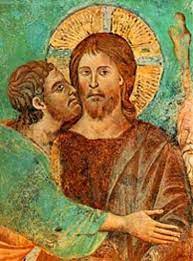___________________________________________________

Sometimes
when we take the high road, we encounter those who will betray us.
These
are people intentionally want to hurt us by stabbing us in the back, or go
behind our backs to try to destroy our reputation, or become conduits for
people critical of us and our motives.
Jesus
had a famous experience with his betrayer Judas Iscariot. History was not kind
to Judas.

“Father, forgive them, they know not what they do.”
These
words are the first of the so-called Seven Last Words of Jesus said from the cross
and they carry much significance.
When we truly follow Jesus, we come to understand that for
forgiveness to happen something in us has to die.
Our pride has to die. Our self-righteousness has to die. Our
anger with others has to die. Our pain has to die.
What’s that old saying? “Not
forgiving someone is like drinking poison and expecting the other person to
die.”

When we forgive, it frees us from the prison
of our resentment.
Forgiveness is a gift we give to others
and to ourselves. It allows us let go of the anger or resentment we’re holding
in your heart and move on.
Just having the desire to forgive is a good
start. You may think, “Well, I can’t do it. I can’t forgive that person.” You
may be right. You may not be able do it. But God can.

This is how we take the high road
to Calvary.
Need
examples of this? Pay close attention to what Jesus is doing in today’s Gospel
Passion.
Even
when Jesus is captured by palace guards, he takes time to show love to one of
them who had his ear lopped off by a disciple, stopping to heal it before being
taken into custody.
Who
does that when faced with such hostility? Jesus does.
Jesus gives us clear examples of how we are to deal with people who wish to do us harm: by showing them love.
To do this, we need to sacrifice our indignation just
like Jesus did to find the new life offered to us by Jesus.
Jesus prays for forgiveness of his persecutors
and betrayers just as he taught his disciples to pray for their enemies and to
do good to those who hurt them in his Sermon on the Plain.
He’s
showing us what love of one’s enemy looks like in practice as he absolves his
very executioners and others from the cross.
Luke
wants us to see that Jesus’ passion is a manifestation of Christ’s greatest
mercy and love for the whole world.
Finally,
let us not forget our old adversary, the devil, who is always lurking in the
shadows of our hearts.
As
former Auxiliary Bishop Daniel Mueggenborg wrote in his book Come Follow Me:
“Satan
waits for opportune times to tempt us… We should not be surprised by that reality
because we see it happening to Jesus on the cross at Calvary.”
We
all know the old saying: “The devil made me do it.”
But
when we take the high road that leads to Calvary, we find the antidote for
thwarting the devil: By becoming imitations of Christ in the world and channels
of his peace.

Yes,
even to our enemies. Yes, even our betrayers.



No comments:
Post a Comment